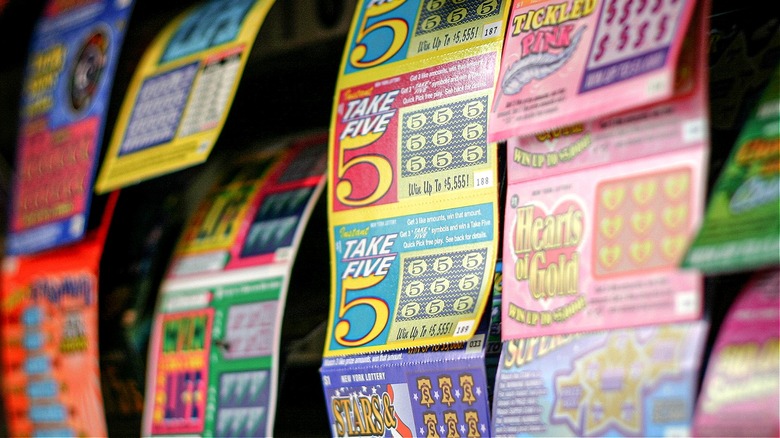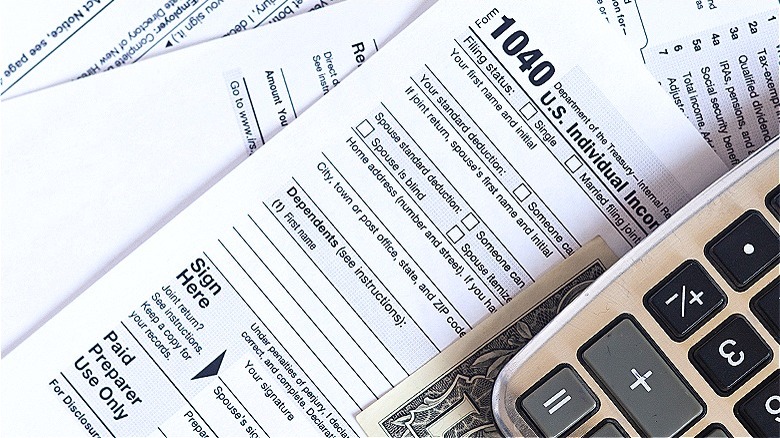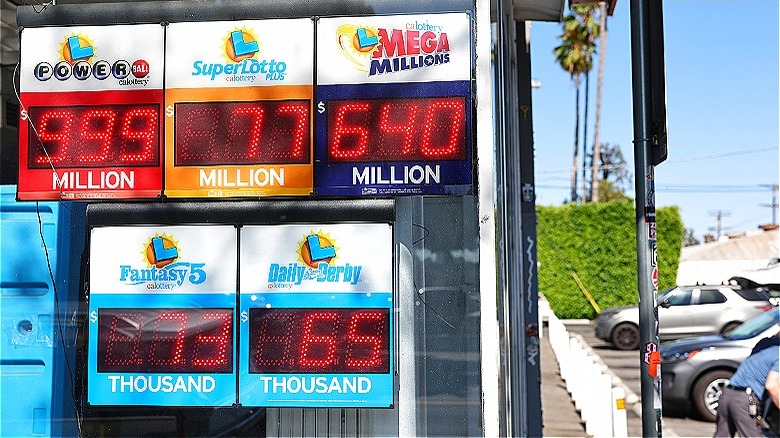How Much Do You Pay In Taxes After Winning The Lottery?
Many people dream about winning the lottery. Whether it's a wish list of what you'd buy first or a fantasy about getting out of debt, the lottery can be an enticing game of luck. In fact, it's so enticing that, according to the North American Association of State and Provincial Lotteries, Americans spent $107.9 billion on lottery tickets in 2022 (via The Ascent). While your chances of winning are less than good (Powerball odds, for example, are 1 in 292.2 million), there are just enough stories out there about people winning to keep lottery hopefuls buying tickets.
Now, if you do find yourself in rare company by winning the lottery, you're sure to have a lot of questions. Chief among them is how much of your winnings will end up going to taxes. You might mistakenly assume that taxes will only be an issue on large winnings or that you'll only have to pay federal taxes. It's also important to realize that how you choose to accept the winnings (as either a lump sum or via monthly payments) can also have a huge impact on your tax liability.
While some financial specialists might recommend taking the lump sum, taking your winnings in installments can significantly lower your tax liability by keeping you in a lower income tax bracket. While winning the lottery is an incredible feat of luck, it can ultimately lead to a financial headache, if you don't properly budget out your options and tax possibilities. Let's dive into what you should know if you win the lottery.
Your income tax bracket
The biggest consideration when anticipating taxes on your lottery winnings comes down to your income tax bracket and how the amount of your winnings might ultimately change it. Since lottery winnings are seen as taxable income, they can and do affect your total reportable income for the year on your taxes. If your winnings are enough to push you into an entirely different IRS tax bracket, then your tax rate will change. Just how much your tax amount changes can be a key consideration when deciding between the lump sum and installment payment methods to collect your winnings. There are different schools of thought on which option might lead to a lower tax liability, so you might want to consult a financial adviser.
It's important to know the IRS will take 24% of your lottery winnings before the money is even issued to you. This automatic tax is applied to all winnings over $5,000, and it is typically withheld by the specific lottery agency you won from. Keep in mind that depending on any potential income bracket changes the winnings might push you into will change the total percentage the IRS expects from you. This means that come tax season you might find you owe even more of your winnings than the original 24% that was taken out. The top federal tax rate for 2024 is 37% and applies to single incomes over $609,350 or married (filing jointly) incomes over $731,200.
State taxes on lottery winnings
You might be wondering if you will also have to pay state taxes on top of your federal taxes. The answer depends entirely on what state you live in. Thirty-six states charge a specific tax on lottery winnings, with an average tax rate of 5.6%. On the flip side, eight states — California, Delaware, Florida, South Dakota, Tennessee, Texas, Washington, and Wyoming — don't charge any tax on lottery winnings. Keep in mind, though, that even if you live in a state without lottery taxes, your winnings will still be subject to the 24% (or more) federal tax rate.
You might not realize this, but not all states have a lottery. Alabama, Alaska, Hawaii, Nevada, and Utah don't have their own state lotteries so residents looking to participate will more than likely have to buy their tickets across state lines in order to play. Further, note that even if you are a resident of a state that either doesn't have a lottery or doesn't charge a state tax on lottery winnings, you can still be subject to state taxes on your winnings. If you purchased your winning lottery ticket from a state with state-specific lottery taxes, you'll more than likely be subject to that state's lottery tax since the earnings technically occurred in that state.
For anyone curious, Florida sells the most lottery tickets in the country, with $9.3 billion in game sales in 2022. California is close behind with $8.9 billion in lottery game sales.


